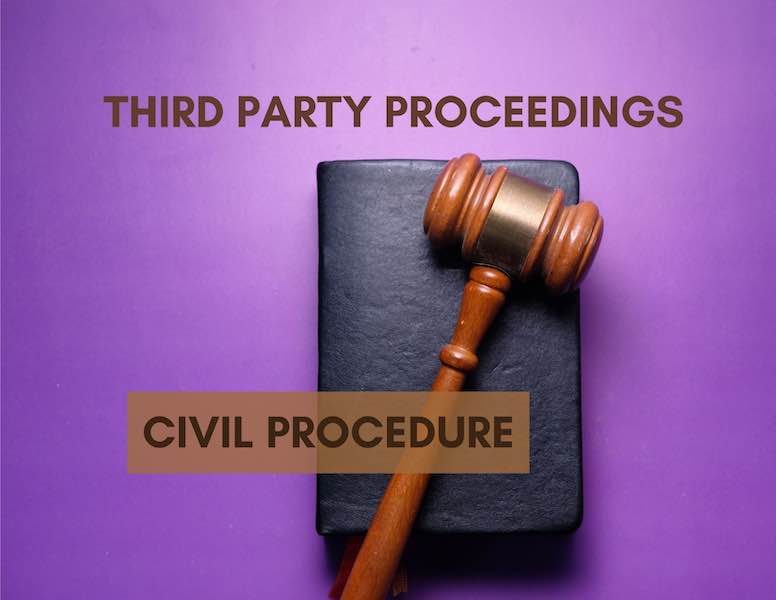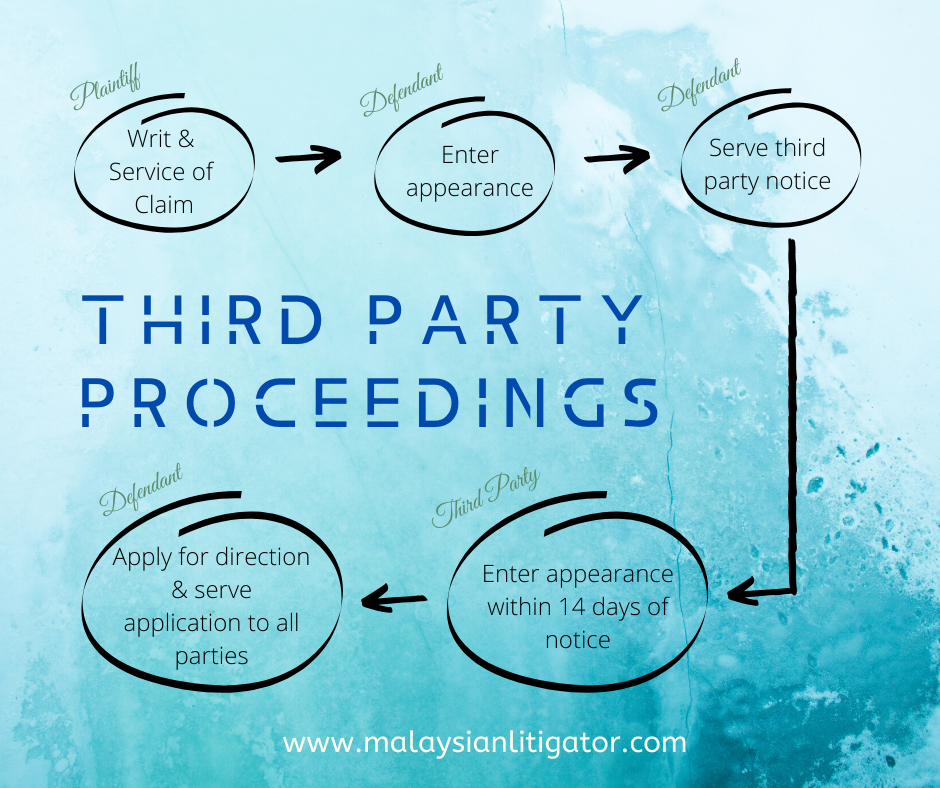Third Party Proceedings: When Is It Too Late?
by Rachel Chong Jia Wei ~ 24 September 2020

Contributed by
Rachel Chong Jia Wei (Post Pupillage Paralegal)
Tel: 603-6201 5678 / Fax: 603-6203 5678
Email: rjw@thomasphilip.com.my
Website: www.thomasphilip.com.my
A defendant can bring third party proceedings against a third party to claim contribution, indemnity or any relief or remedy which is substantially the same as claimed by the plaintiff. Further, a defendant may take third party proceedings to determine any question or issue related to the original subject matter of the claim.
Third party proceedings are independent and separate proceedings from the main action between the plaintiff and defendant. In the third party proceedings, the defendant becomes the plaintiff, and the third party becomes the defendant. When a defendant is held liable to the plaintiff, his right opens up to establish that he possesses a right to obtain contribution or indemnity from the third party.
Examples of Third Party Proceedings
Example #1
Vince was involved in a road accident when he was a pillion passenger of Mike’s motorcycle. The motorcycle collided into a lorry which switched lanes without giving turn signals. Vince, who suffered broken ribs, broken right leg and severe bruises on his body, decided to file a claim against the lorry driver for negligent driving.
Param, the lorry driver, insisted that he was not at fault; but Mike is, for riding the motorcycle at high speed without keeping a proper lookout. Since Mike is Vince’s best friend, Vince would not add Mike as a party to the suit. Instead, Param can initiate third party proceedings against Mike.
Example #2
Kit hired Lim to renovate his house. Lim constructed a new balcony for Kit as instructed.
After the renovation, Kit invited his friends for a house-warming party. When Kit was showing his friends the new balcony, the balcony collapsed and injured two of his friends. His friends sued him. Kit can claim damages from Lim by third party proceedings.
Procedure
In a civil claim, the plaintiff will file and serve to the defendant a writ and statement of claim. The defendant will have to enter appearance by completing a memorandum of appearance. After entering appearance, the defendant may issue a third party notice without leave if the defendant has not served his defense. The defendant must then serve the third party notice personally to the third party with a copy of the writ and pleadings if any. The third party must enter appearance within fourteen days after being served the notice. After that, the defendant must apply for directions and serve the application to all the parties of the suit.

If the defendant only decided to initiate third party proceedings after serving his defense, he will have to apply for leave of court to issue the third party notice. The application for leave is by way of an ex-parte notice supported by an affidavit. The court has complete discretion on whether to grant leave or not. One of the considerations that the court will take into account is the timing of the application.
The Mid Valley Bridge Case
Do you remember the collapse of the link bridge between KL Eco City and Mid Valley City which resulted in the amputation of a construction worker’s leg?
The developer of KL Eco City sued the main contractor and the sub-contractor of the construction on 17 March 2017. The trial had commenced, and seven Plaintiff’s witnesses had provided their testimonies when the defendants applied to commence third party proceedings against the structural and civil engineer appointed by the developer.
The court, in this case, KL Eco City Sdn Bhd v Tuck Sin Engineering & Construction Sdn Bhd & Anor (TY Lin International Sdn Bhd, third party) [2018] MLJU 1630, struck out the application to add the third party because of the following reasons:-
Inordinate delay of the disposal of the main action.
Prejudice to the Plaintiff.
No prejudice to the defendants.
The filing of the third party proceedings application at such a late stage would have the effect of delaying the trial. The delay is due to the time needed for the pleadings and any pre-trial directions given to the defendants and third party in the third party proceedings to be completed. When the third party is prepared to proceed to trial, more time and costs had to be expended to recall the witnesses that testified earlier to be cross-examined and re-examined.
As such, even during case management stage, the court in Kewangan Bersatu Bhd v Victory Ceramics Industries Sdn Bhd & Ors [2002] 5 MLJ 225 held that a third party proceedings application is an abuse of court process. The main action would be delayed for months, even years, for the parties to file, serve and amend the pleadings. The same was echoed in Dato’ Abul Hasan bin Mohamed Rashid v Multi-Code Electronics Industries & Anor [2012] 5 MLJ 176 where the defendant took nearly three years to file the third party proceedings.
If third party proceedings are allowed at an advance stage, it will cause significant prejudice to the plaintiff, crushing its expectation of speedy disposal of the case. The plaintiff has to sit through the proceedings when the Third Party proceeds with the trial, incurring more time and money.
On the contrary, the defendant will not suffer any prejudice if the third party proceedings are set aside. The defendant has the right to bring a fresh suit against the third party. Moreover, the defendant is not time-barred as time begins to run from the date the defendant is held liable as per Mat Abu bin Man v Medical Superintendent [1989] 1 MLJ 226.
Filing a new suit against the third party will not prejudice the third party either. Even if the court, wanting to save time, orders for the import of the notes of evidence of the main action, it will only be done with the consent of the parties. The third party will, of course, be allowed to recall the witnesses.
Conclusion
Third party proceedings is a mechanism devised to avoid the multiplicity of suits, thereby saving time and money. Nevertheless, this objective can only be achieved if the application is made promptly at the early stage of proceedings. Otherwise, the court views it as an abuse of court as late commencement of third party proceedings will cause the main action to be unduly protracted. Therefore, lawyers for defendants should always immediately explore all avenues upon taking on the brief.